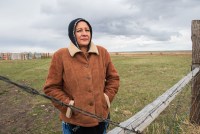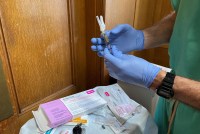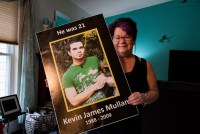Latest KFF Health News Stories
Datos de las sobredosis, obtenidos por colaboración colectiva, resaltan en dónde hace falta la ayuda
El proyecto de la Universidad de Texas, llamado TxCOPE, busca resolver un problema que mantiene en vilo a los funcionarios de todo el país en su esfuerzo por reducir el número récord de muertes por drogas: obtener una imagen clara y precisa de las sobredosis no mortales y mortales.
Crowdsourced Data on Overdoses Pinpoints Where to Help
University of Texas researchers are testing a program that would allow harm reduction groups to crowdsource data on fatal and nonfatal drug overdoses statewide. While the data relies on word of mouth, they say, it is more comprehensive than anything that exists now and can be used immediately to prevent overdoses.
Overdose Deaths Behind Bars Rise as Drug Crisis Swells
Drug-related mortality rates have increased in prisons and jails even as the number of people incarcerated for drug offenses has dropped. The pandemic lockdowns on visitors didn’t eliminate the problem, showcasing that guards have been a source of the contraband.
Readers and Tweeters Weigh In on Medical Debt, the Obesity Epidemic, and Opioid Battles
KHN gives readers a chance to comment on a recent batch of stories.
Sobering Lessons in Untying the Knot of a Homeless Crisis
The homeless tragedy in Portland, Oregon, now spills well beyond the downtown core, creating a crisis of conscience for a fiercely liberal city that has generously invested in homeless support services.
The Blackfeet Nation’s Plight Underscores the Fentanyl Crisis on Reservations
The deadly synthetic opioid has spread across the nation during the pandemic, and the problem is disproportionately affecting Native Americans.
El nuevo movimiento MADD: padres toman acción contra las muertes por drogas
Siguiendo el modelo de Mothers Against Drunk Driving, que generó un movimiento en la década de 1980, organizaciones como Victims of Illicit Drugs y Alexander Neville Foundation buscan aumentar la conciencia pública e influir en las políticas sobre drogas.
The New MADD Movement: Parents Rise Up Against Drug Deaths
People who have lost children to pills laced with fentanyl are demanding that lawmakers adopt stricter penalties and are pressuring Silicon Valley for social media protections. The movement harks back to the 1980s, when Mothers Against Drunk Driving activated a generation of parents.
¿Puede una inyección mensual frenar la adicción a opioides? Expertos dicen que sí
Una opción inyectable mensual para el tratamiento de la adicción a opioides no logra llegar a todos los que la necesitan por las trabas burocráticas para obtener el medicamento.
Can a Monthly Injection Be the Key to Curbing Addiction? These Experts Say Yes
In California, where overdose deaths are on the rise, physicians say administering anti-addiction medication as a monthly injection holds tremendous potential. So, why aren’t more patients getting it?
Never-Ending Costs: When Resolved Medical Bills Keep Popping Up
A bill one family considered paid wrongfully resurfaced, resurrecting painful memories. It’s a scenario that’s not uncommon but grievously unsettling.
$11M for North Carolina Work-Based Rehab Raises Concerns
As overdoses surge and opioid settlement dollars flow, funding to North Carolina rehab foreshadows national discussion about the best approaches to treatment.
At a Tennessee Crossroads, Two Pharmacies, a Monkey, and Millions of Pills
Prosecutors say opioid-seeking patients drove hours to get their prescriptions filled in Celina, Tennessee, where pharmacies ignored signs of substance misuse and paid cash — or “monkey bucks” — to keep customers coming back.
Money Flows Into Addiction Tech, But Will It Curb Soaring Opioid Overdose Deaths?
Experts are concerned that flashy Silicon Valley technology won’t reach those most in need of treatment for substance use disorders.
Calls to Overhaul Methadone Distribution Intensify, but Clinics Resist
The pandemic has shown that loosening the strict regulations on distributing methadone helps people recovering from addiction stay in treatment. But clinics with a financial stake in keeping the status quo don’t want to make permanent changes.
KHN’s ‘What the Health?’: Why Health Care Is So Expensive, Chapter $22K
Congress is making slow progress toward completing its ambitious social spending bill, although its Thanksgiving deadline looks optimistic. Meanwhile, a new survey finds the average cost of an employer-provided family plan has risen to more than $22,000. That’s about the cost of a new Toyota Corolla. Alice Miranda Ollstein of Politico, Anna Edney of Bloomberg News and Rebecca Adams of CQ Roll Call join KHN’s Julie Rovner to discuss these issues and more. Also this week, Rovner interviews Rebecca Love, a nurse academic and entrepreneur, about the impending crisis in nursing.
Watch: Going Beyond the Script of ‘Dopesick’ and America’s Real-Life Opioid Crisis
KHN teamed up with Hulu for a discussion of America’s opioid crisis, following the Oct. 13 premiere of the online streaming service’s new series “Dopesick.”
KHN’s ‘What the Health?’: The Politics of Vaccine Mandates
Like almost everything else associated with the covid-19 pandemic, partisans are taking sides over whether vaccines should be mandated. Meanwhile, Democrats on Capitol Hill are still struggling to find compromise in their effort to expand health insurance and other social programs. Alice Miranda Ollstein of Politico, Jen Haberkorn of the Los Angeles Times and Mary Ellen McIntire of CQ Roll Call join KHN’s Julie Rovner to discuss these issues and more. Also this week, Rovner interviews best-selling author Beth Macy about her book “Dopesick,” and the new Hulu miniseries based on it.
KHN’s ‘What the Health?’: Abortion Politics Front and Center
The polarizing abortion issue threatens to tie up Congress, the Supreme Court and the states for the coming year. Meanwhile, Congress kicks the can down the road to December on settling its spending priorities. Joanne Kenen of Politico and the Johns Hopkins School of Public Health, Yasmeen Abutaleb of The Washington Post and Sarah Karlin-Smith of the Pink Sheet join KHN’s Julie Rovner to discuss these issues and more.
Also this week, Rovner interviews KHN’s Aneri Pattani, who delivered the latest KHN-NPR “Bill of the Month” episode about a covid test that cost as much as a luxury car.
As Holdout Missouri Joins Nation in Monitoring Opioid Prescriptions, Experts Worry
Missouri is the last state to create a monitoring program to help spot the misuse of prescription drugs. But some public health experts warn that the nation’s programs are forcing people addicted to opioids to seek deadlier street options.





















